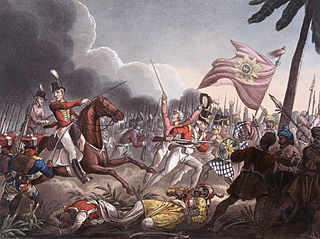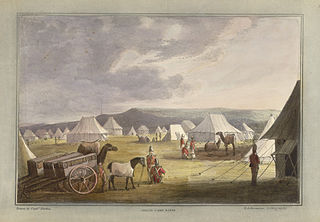Related Research Articles

The Second Anglo-Maratha War (1803–1805) was a large conflict within the Maratha Confederacy involving the British East India Company. It resulted in major loss of territory for the Marathas, including regions around Delhi and in present-day Gujarat falling into direct Company rule.

The Third Anglo-Maratha War (1817–1819) was the final and decisive conflict between the British East India Company and the Maratha Empire in India. The war left the Company in control of most of India. It began with an invasion of Maratha territory by British East India Company troops, and although the British were outnumbered, the Maratha army was decimated. The troops were led by Governor General Hastings, supported by a force under General Thomas Hislop. Operations began against the Pindaris, a band of Muslim mercenaries and Marathas from central India.

Balaji Baji Rao, often referred to as Nana Saheb I, was the 8th Peshwa of the Maratha Empire. He was appointed as Peshwa in 1740 upon the death of his father, the Peshwa Bajirao I.

The First Anglo-Maratha War (1775–1782) was the first of three Anglo-Maratha Wars fought between the British East India Company and Maratha Confederacy in India. The war began with the Treaty of Surat and ended with the Treaty of Salbai. The war, fought in between Surat and Poona, saw British defeat and restoration of positions of both the parties before the war. Warren Hastings, the first Governor-General of Bengal decided not to attack Pune directly.

Vasai is a historical place and city located in Palghar district; which was partitioned out of the Thana district in 2014. It also forms a part of Vasai-Virar twin cities in the Konkan division, Maharashtra, India, and comes under the Police Jurisdiction of Mira-Bhayander, Vasai-Virar Police Commissionerate.

The Bombay Presidency or Bombay Province, also called Bombay and Sind (1843–1936), was an administrative subdivision (province) of British India and later the Dominion of India, with its capital in the city that came up over the seven islands of Bombay. The first mainland territory was acquired in the Konkan region with the Treaty of Bassein. Poona was the summer capital.

Fort Vasai is a ruined fort of the town of Vasai (Bassein), Konkan Division, Maharashtra, Indian Union. The structure was formally christened as the Fort of St Sebastian in the Indo-Portuguese era. The fort is a monument of national importance and is protected by the Archaeological Survey of India.

Raghunathrao Bhat, also known as Ragho Ballal or Raghoba Dada, was the younger son of Peshwa Bajirao I who served as the 11th Peshwa of the Maratha Empire for a brief period from 1773 to 1774.
Mulher is a village in the Nashik district of Maharashtra, India.

The Treaty of Bassein was a pact between the English East India Company and Baji Rao II, the Maratha confederacy's Peshwa, it was signed on 31 December 1802 after the Battle of Poona, at the present day Bassein (Vasai). The treaty was a decisive step in the dissolution of the Maratha Empire, which led to the East India Company's annexation of the empire's territories in western India in 1818.

Battle of Surat, also known as the Sack of Surat, was a land battle that took place on 5 January 1664, near the city of Surat, in present-day Gujarat, India, between Shivaji, leader of the fledgling Maratha State and Inayat Khan, a Mughal commander. The Marathas defeated the Mughal military unit posted at Surat and ransacked the city.

The Battle of Sinhagad, also known as Battle of Kondhana, involved an attack by Marathas during the night of 4 February 1670 on the fort of Sinhagad, near the city of Pune, Maharashtra. The Marathas captured the fort.

The Jawhar State was a princely state in India. As a princely state, it became a part of Bombay Presidency during the British Raj. It was the only state belonging to the Thana Agency.
Rander is a town in Surat district in the state of Gujarat, India. Located on the bank of the Tapti River, it is 2 kilometres (1.2 mi) from the city of Surat.

Janjira State was a princely state in India during the British Raj. Its rulers were a Siddi dynasty of Habesha descent and the state was under the suzerainty of the Bombay Presidency.

The Battle of Purandar was fought between the Mughal Empire and the Marathas in 1665.
The Battle of Salher was fought between the Marathas and the Mughal Empire in February 1672 CE. The battle was fought near the fort of Salher in modern day Nashik district. The result was a decisive victory for the Marathas. This battle is considered particularly significant as it is the first pitched battle where the Mughal Empire lost to the Marathas.

The Battle of Vijaydurg was fought between Tulaji Angre, the Admiral of the Maratha Navy and the combined forces of the East India Company and the Maratha Confederacy led by Peshwa Balaji Bajirao in early 1756.

The Gujarat Subah was a province (subah) of the Mughal Empire, encompassing the Gujarat region. The region first fell under Mughal control in 1573, when the Mughal emperor Akbar defeated the Gujarat Sultanate under Muzaffar Shah III. Muzaffar tried to regain the Sultanate in 1584 but failed. Gujarat remained the Mughal province governed by the viceroys and officers appointed by the Mughal emperors from Delhi. Akbar's foster brother Mirza Aziz Kokaltash was appointed as the subahdar (viceroy) who strengthened Mughal hold over the region. The nobles of former Sultanate continued to resist and rebel during the reign of the next emperor Jahangir (1605–1627) but Kokaltash and his successor subahdars subdued them. Jehangir also permitted the British East India Company to establish factories in Surat and elsewhere in Gujarat. The next emperor Shah Jahan (1627–1658) expanded his territories in south and his subahdars made hold over Kathiawar peninsula including Nawanagar. Shah Jahan had also appointed his prince Aurangzeb, who was involved in religious disputes, prince Dara Shikoh and later prince Murad Bakhsh as subahdars. Following battle of succession, Aurangzeb (1658–1707) came to the Mughal throne and his policies resulted in revolts and discontent. During his reign, the Marathas under Shivaji raided Surat (1666) and their incursions in Gujarat started. Till then Gujarat prospered due to political stability, peace and growing international trade.